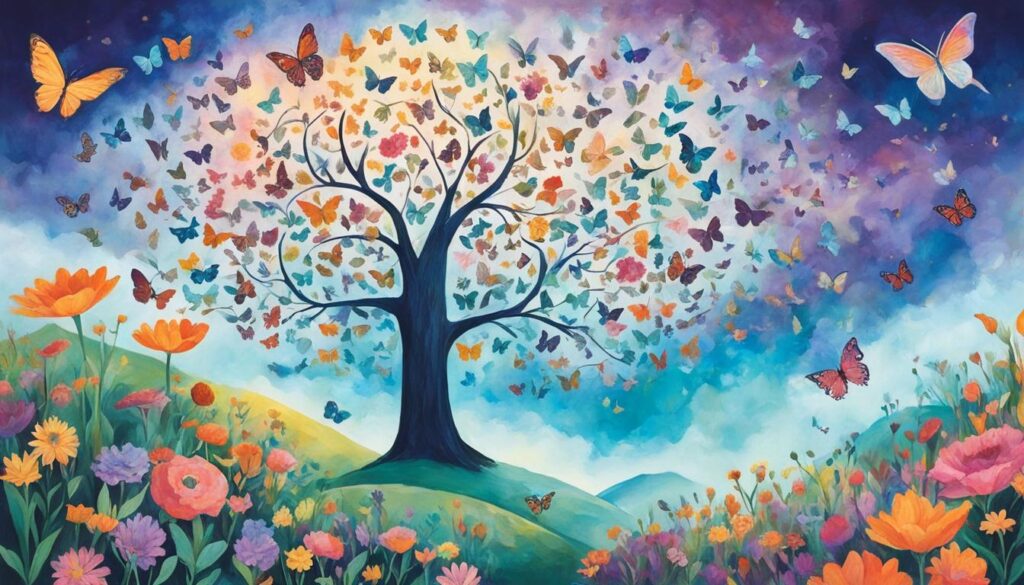There’s a curious allure to the nocturnal realms of our minds, where the boundaries of waking life blur, revealing perplexing dreamscapes. Consider, for instance, the dream where one’s adversary sheds their cloak of animosity, opting instead for a handshake or a smile. As I delve into the intricacies of such a scenario, I’m struck by the intricate web of dream interpretation and the subconscious messages that it may harbor.
The world of enemy dreams and their transformation into amicable dream figures is as bewildering as it is enlightening. Like a puzzle begging to be solved, these dreams challenge me to look beyond the surface — to seek out the hidden dream symbolism that whispers the deeper truths about my inner self and its workings.
It’s my personal experiences, those taut threads of emotion and memory, that embroider the fabric of my dreams. Each thread is a narrative, and within it lies a possibility — the chance to reconcile with the aspects of my own personality that I’ve labeled as foes, or perhaps to acknowledge a desire to mend fences in the waking world. The dance between my subconscious thoughts and the manifestations in my dreams is a complex one, replete with spiritual and psychological significance that I’m eager to untangle.
As I analyze the appearance of foes turned friends in my dreams, I’m not just decoding a mysterious message; I’m uncovering a narrative that mirrors my reality. The insights gleaned offer glimpses of my personal development trajectory. The data and facts of dream research are my allies, providing a framework upon which my subjective experiences can be rationally understood.
Key Takeaways
- Enemy dreams can symbolize subconscious reconciliation and personal growth.
- Amicable dream figures may reflect a deep-seated desire for resolving conflicts.
- Dream symbolism often serves as a bridge between our inner thoughts and real-life situations.
- Understanding the psychological significance of dreams contributes to insightful self-reflection.
- Interpreting enemy-turned-friend scenarios relies heavily on personal context and emotions.
- The intersection of spiritual and analytical approaches enriches the process of dream interpretation.
Understanding the Meaning Behind Friendliness in Dreams

As we plunge into the depths of dream psychology, the perception of an enemy exhibiting amiable traits in a dream scenario beckons for both an emotional analysis and an exploration of the subconscious mind. When immersed in the landscape of nocturnal narratives, one often encounters the unexpected—a nemesis transforming into an ally—and may wonder about the implications of reconciliatory dreams.
Exploring the Conscious VS Unconscious Mind in Dream Interpretation
Dreams are a battleground for the conscious experiences and the vast, uncharted territory of the unconscious mind. During restful slumber, the barriers between these realms seem to blur, allowing the subconscious mind to communicate with us through cryptic symbols and events. One may find that a dream of an enemy being friendly is not a desire for peace in the waking world, but rather a message from the subconscious mind seeking resolution within oneself.
Significance of Positive Emotions in a Normally Negative Context
Encountering a typically adversarial figure in a genial role can stir a mix of emotions. This dichotomy challenges the dreamer to reflect on the duality of their feelings and encourages a personal emotional analysis. Such dreams can signal a transition, a desire for harmony, or an evolution of the dreamer’s perspective regarding an individual or a conflicting situation in real life.
Psychological Theories on Dreams Involving Opponents
A variety of psychological theories shed light on why dreams with foes turned friends occur. Renowned figures like Sigmund Freud and Carl Jung have paved the way in understanding the intricate symbolism behind our nocturnal thoughts. These theories suggest that dreams which cast our enemies in a counterintuitive friendly role may represent an internal quest for balance or merely echo our hidden desires for reconciliation on some level.
| Theory | Interpretation | Relevance to Friendly Enemy Dreams |
|---|---|---|
| Freud’s Psychological Projection | Unconscious feelings towards oneself projected onto others. | Enemy’s friendliness may reflect a subconscious acceptance of one’s own flaws. |
| Jung’s Shadow Aspect | The unknown dark side of the personality. | Friendliness symbolizes the integration of the shadow with conscious awareness. |
| Modern Cognitive Theories | Dreams are a cognitive simulation of real life experiences. | Indicates a cognitive rehearsal for a potential reconciliatory situation. |
In my examination of such dreams, I believe they reveal not just a curiosity but a necessary engagement with the psyche—prompting a spiritual and psychological journey towards comprehending the multifaceted self.
Dream of Enemy Being Friendly: Personalized Dream Analysis
When we delve into personal dream analysis, it’s startling how unique dream meanings can inform our understanding of our waking life. The unexpected scenario of dreaming of an enemy being friendly often prompts me to reflect deeply on my current emotional states and relationships. Such dreams aren’t merely coincidental—they often mirror our desires, fears, and the nuances of our personal journeys.

The dream reflection process is akin to peering through a looking glass that reveals more than the superficial enigma of dreaming about an adversary turned ally. It requires an honest inventory of one’s emotional reservoir. Digging deeply, one might find that this dream is not just an amusing rerun of day-to-day experiences but a mosaic of compassion, forgiveness, or unresolved conflict.
My exploration into the phenomenon of dreaming of an enemy being friendly uncovered layers of my emotions tied to a past rivalry that I had since forgotten in my conscious life.
Real-life situations, such as a recent argument or a gesture of good will from someone we’ve previously clashed with, can resurface in dreams as metaphors for reconciliation. They may be reflections of a conscious attempt to make peace or subconscious wishes to put an end to ongoing strife. Below I list some personal factors that can influence these dreams:
- **Recent Experiences:** A confrontation or an unexpected kind interaction with someone viewed as an enemy.
- **Emotional States:** Current feelings of guilt, regret, or the desire for a fresh start.
- **Personal Relationships:** The evolving dynamics with acquaintances, colleagues, or family members.
However, it’s critical to emphasize that unique dream meanings are not one-size-fits-all. The smile of an enemy in a dream could symbolize pending forgiveness in my life, while for someone else it might represent a wish to understand an adversary better. This dream of enemy being friendly requires a personalized interpretation that aligns with one’s life narrative, offering potential insights into paths towards emotional resolution and personal growth.
Relationship Between Dreams of Amiability With Foes and Real Life Encounters
While we often see dreams as mystifying narratives detached from our daily lives, they can often mirror the underlying currents of our interpersonal world. In my journey through subconscious dream analysis, I’ve found that dreams where an enemy becomes a comrade may not simply be whims of the mind but could, in fact, be a reflection of an inner desire or unrecognized potential for conflict resolution. These nighttime visions can offer a unique insight into our psyche, proposing a space where we can grapple with opposition in a positive, transformative manner.
Navigating the Positive Aspects of Conflict Through Dreams
Conflict in waking life can be tumultuous, yet, my dreams tell a different story. By transforming adversaries into allies within the dream realm, my subconscious suggests that there’s a part of me seeking personal development through resolution rather than antagonism. This intriguing transmutation in dreams raises a significant question: could this be an untapped resource for fostering peace in my external relations? The sunder between conscious intention and subconscious wish often sparks a crucial internal dialogue regarding my approach to real-life conflicts.
How Your Dream May Reflect Real-World Reconciliation
On many occasions, the dream of an enemy being friendly serves as an avant-garde indicator of possible real-life reflection. Remembering my dreams prompts me to wonder whether these scenarios are forecasting a trajectory toward genuine reconciliation with those I’ve deemed as foes. Spiritual and psychological viewpoints both attest that dreams are not random; they carry significant meaning. Not everything is as black and white as it seems in the waking world, and my dreams might be heralding a bridge to understanding and compassion that I had previously thought non-existent or unattainable.
What the Subconscious Suggests About Your Interpersonal Relationships
Meticulous examination of these dream instances spotlights the intricate web of my interpersonal relationships. The subconscious doesn’t speak in direct terms; it converses in symbols and scenarios. By interpreting a dream where a rival extends a hand in friendship, I’m often led to discover latent feelings of respect or a secret longing for harmony. Deciphering these messages not only enlightens my conscious mind but also aids in navigating the spiritual and psychological dimensions of my relationships. The bonds we form, contend with, and yearn to repair are vividly portrayed in the amphitheater of our dreams, awaiting our attention upon awakening.